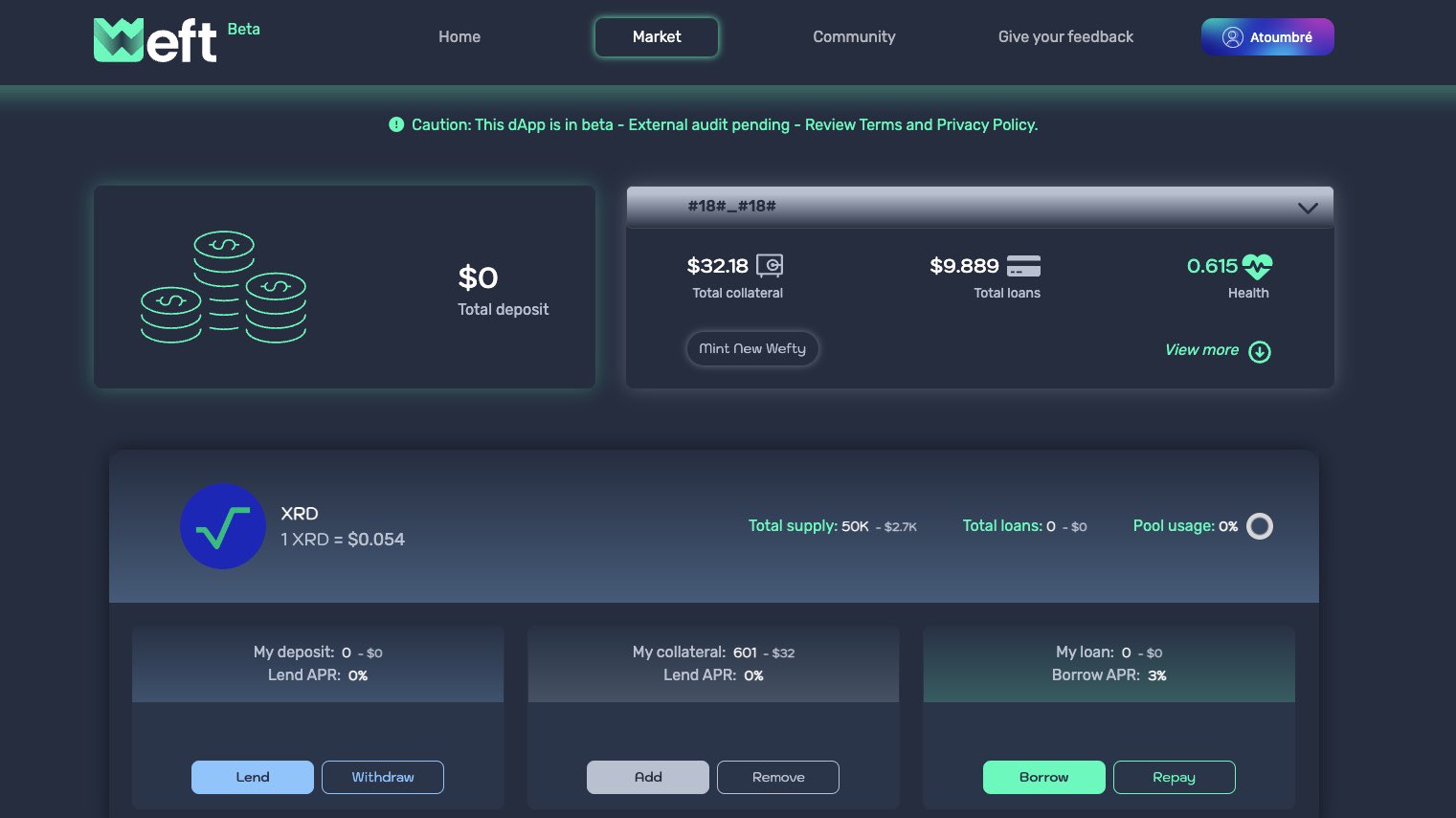Weft Finance is a decentralized lending and borrowing platform built on Radix. At the heart of Weft lies the creation and management of collateralized debt positions (CDPs) represented by NFTs, known as ‘Wefties.’
History
Weft was founded by two Ivory Coast engineers, Yetinin Coulibaly and Atoumbré Kouassi. Living in different continents, with Coulibaly in Paris and Kouassi in Abidjan, they came together with a shared vision for financial innovation and economic development in Africa. Their collaboration began in 2021 when both became active members of the Radix Community. Despite having never met, the two engineers discovered a shared vision for the future and a strong alignment in values.
After meeting in person in Abidjan in fall 2022, they decided to form a partnership and build their first decentralized application (dApp) for lending and borrowing financial services. This led to the creation of Weft, aiming to harness the transformative potential of RadixDLT for the future of DeFi.
The platform is now developed by a team of seven individuals, collectively known as Weft'ers.

Features
Weft offers several key features to facilitate lending and borrowing of digital assets:
Lending Pools: Weft utilizes lending pools that hold assets deposited by lenders. Each pool is designated for a specific asset type. Lenders receive deposit units representing their share of the pool.
Loan Units: Borrowed amounts are tracked using loan units, which reflect a borrower's share of debt obligation. Interest accrual is handled through the loan unit system.
Interest Rate Strategies: Interest rates are set dynamically based on lending pool usage through predefined interest rate strategies. This allows rates to adapt to market conditions.
Borrowing Power Delegation: Users can delegate their borrowing power by minting a linked "delegated Weftie" NFT and sending it to another user. The recipient can then borrow without needing collateral.
Liquidations: Loans with insufficient collateral can be liquidated by external entities or automatically. This sells collateral to repay loans and brings loan-to-value ratios back into a healthy range.
User Positions Operations: Weft supports position modifications like collateral swaps and direct loan repayment using collateral ("self-liquidation").
The system is designed to be flexible, secure, and capture the nuances of each loan through use of the non-fungible Wefties.
Components
Weft Finance relies on several key components to enable its lending and borrowing functionality:
Lending Pools
Hold assets deposited by lenders and act as reserves for borrowers
Each pool is for a specific asset type (e.g. $XRD)
Mint deposit units to track lenders' shares
Manage accrued interest on loans
Provide flash loans
Lending Market
Acts as the interface between lenders/borrowers and lending pools
Handles borrowing, repaying loans, liquidations, withdrawals
Ensures security through badges and access rules
Validates and extends Wefties to enable pool interactions
Wefties
NFTs that contain users' collateral & loan positions
Secure metadata that stores deposit unit collateral amounts and loan unit borrowed amounts
Controls enforced by Lending Market badge
$WEFT Token
Last resort protection against market volatility risks
Stakers can deposit $WEFT to mitigate potential insolvencies
Stakers earn a portion of collected fees as insurance premiums
This modular architecture maximizes flexibility and security of lending operations.
Operations
Weft supports several key operations for lenders and borrowers:
Lending
Users contribute assets to lending pools
They receive deposit units representing pool shares
Deposit units can be redeemed for assets
Borrowing
Validates the Weftie NFT and extends it
Executes borrowing order through pool interactions
Performs health checks on loans and updates Weftie
Interest Accrual
Interest rates set dynamically based on pool usage
Accrued by increasing total borrowed amount
Deposit and loan units remain constant
Revenue
Collected from loan interest, flash loan fees, liquidation bonuses
Shared between operations costs and insurance module
Insurance Module
Accepts staked WEFT tokens
Tokens sold to cover losses in extreme situations
Stakers earn portion of revenue as insurance premium
Weft aims to make lending and borrowing as seamless as possible while keeping operations decentralized and secure.
Roadmap
Weft Finance has laid out a roadmap to drive the growth and adoption of its lending and borrowing platform:
Q3 2023
✅ Launched validator node, distributing $WEFT tokens to stakers
✅ Introduced Weft Alpha version on testnets for early feedback
Q4 2023
✅ Initiated $WEFT token listing and liquidity mining incentives
✅ Released Beta version on updated testnet after Babylon launch
✅ Started auditing Scrypto code prior to mainnet
✅ Launched mainnet MVP after completing audits
✅ Introduced Weft staking and early adopter incentives
2024
Planning interface upgrades and mobile app launch
Transitioning towards a DAO model by end of 2024
The roadmap focuses on iterative community-driven development, testing, and upgrades to eventually decentralize Weft into a DAO.
Team
Atoumbré Kouassi
With a Master's degree in Applied Statistics and Economy, Kouassi has had a successful career in support service management in Abidjan. A dedicated professional, Kouassi has been following and experimenting with blockchain technology since 2013. His search for an efficient distributed ledger technology led him to discover Radix DLT, which would become the foundation for Weft.
Yetinin Coulibaly
A master in Embedded Electronics and Industrial Computing, Coulibaly is a lead developer based in Paris. He has a strong entrepreneurial spirit, having instigated a Senegal-based startup that provided digital ticketing solutions for transportation and event sectors. Coulibaly's drive and interest in blockchain technology eventually led him to join the Radix Community and embark on the journey of co-founding Weft.
Zivile
Community Manager
Penifana
Frontend Developer
Roland
Backend Developer
Maxence
Project Manager
Amadou
PhD Advisor providing research guidance

